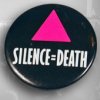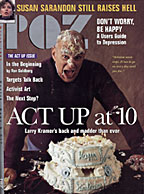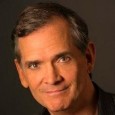 ACT UP’s 25th anniversary this month has prompted reflection on ACT UP over the years. The column that follows is what I wrote in POZ on the occasion of ACT UP’s 10th anniversary, in 1997. I am proud of my work with ACT UP and believe it played an important role in my survival. But amidst the commemoration of and reflection on ACT UP’s triumphs and successes--now immortalized in film and books and other media, as well as in the memories of those involved--I hope we’ll also look deeper into the roots of the empowerment movement for people with HIV. Those roots pre-date ACT UP, with the Denver Principles, the People With AIDS Coalition and similar efforts. I also hope we’ll not overly-romanticize activism of those early years and not lose the ability to look critically at our own community’s efforts. We made mistakes, to be sure, including through ACT UP. If we’re to be responsible to our history and to the lives of so many who fought for our survival, we need to be honest and clear-eyed about what we did and did not do. Some of our greatest triumphs, like expediting the drug approval process to get drugs to people who were dying and had few or no other choices for a chance at survival, also had unintended consequences, like playing into a corporate anti-regulatory agenda that has not always turned out well for consumers of prescription products. We need to see our activism in a broad context, understanding how it affected us as well as the broader society, in order to honestly appraise and learn from those years.
ACT UP’s 25th anniversary this month has prompted reflection on ACT UP over the years. The column that follows is what I wrote in POZ on the occasion of ACT UP’s 10th anniversary, in 1997. I am proud of my work with ACT UP and believe it played an important role in my survival. But amidst the commemoration of and reflection on ACT UP’s triumphs and successes--now immortalized in film and books and other media, as well as in the memories of those involved--I hope we’ll also look deeper into the roots of the empowerment movement for people with HIV. Those roots pre-date ACT UP, with the Denver Principles, the People With AIDS Coalition and similar efforts. I also hope we’ll not overly-romanticize activism of those early years and not lose the ability to look critically at our own community’s efforts. We made mistakes, to be sure, including through ACT UP. If we’re to be responsible to our history and to the lives of so many who fought for our survival, we need to be honest and clear-eyed about what we did and did not do. Some of our greatest triumphs, like expediting the drug approval process to get drugs to people who were dying and had few or no other choices for a chance at survival, also had unintended consequences, like playing into a corporate anti-regulatory agenda that has not always turned out well for consumers of prescription products. We need to see our activism in a broad context, understanding how it affected us as well as the broader society, in order to honestly appraise and learn from those years.
S.O.S.-March 1997
We need grass-roots activism as much today as when ACT UP began
 Last December, I got a call from a TV news producer. The White House had just released its so-called “National AIDS Strategy.” The produce asked, “Doesn’t this report sound like the president has embraced the goals of ACT UP?” I explained that he had done no such thing, that the document was yet another elaborate (and sadly familiar) public-relations con-a clever repackaging of existing do-little policies and lofty rhetoric.
Last December, I got a call from a TV news producer. The White House had just released its so-called “National AIDS Strategy.” The produce asked, “Doesn’t this report sound like the president has embraced the goals of ACT UP?” I explained that he had done no such thing, that the document was yet another elaborate (and sadly familiar) public-relations con-a clever repackaging of existing do-little policies and lofty rhetoric.
But her question reminded me of how far we’ve come in the decade since ACT UP began-and how far we’ve yet to go. In June 1987, when I was arrested in front of the White House, along with 63 others demanding AIDS action, Ronald Reagan had only the night before-six years into the exploding epidemic-given his first AIDS speech. His AIDS policies were an evil brew of malign neglect and cruel stigmatization. Talk of quarantine was in the air. The FDA took forever to approve drugs. Researchers ran pitifully few-often unethical or repetitive-trials, with no community input. The few promising drugs were priced beyond greed.
These were the outrages that pushed me, and thousands of others, to join ACT UP. It was an exciting time of my life, when I became part of this surging energy of angry, creative people determined to stop the dying. What we accomplished was nothing short of amazing. Not only did we change many horrendous AIDS policies of government, science and industry, but our actions raised the whole country’s consciousness and compassion-to such an extent that now most politicians at least give lip service to our goals.
ACT UP also laid the groundwork for a new generation of community-based institutions to fight AIDS. POZ is one of those. It sprang out of my desire to simplify, popularize and broadly disseminate the huge volume of life-sustaining information-and inspiration-I had already found critical to my own survival.
So today, while the form of my activism has changed, I am as proud as ever of my ACT UP days. And my commitment to the ideals of nonviolent direct action to radically change the health care/wealth care monstrosity has only grown stronger. From the sky-high prices of drugs to the cruel slashing of social services to the genocidal tragedy of the continuing Clinton/Shalala HIV infections caused by their needle-exchange cowardice, it’s clear we need grass-roots activism as much today as when ACT UP began.
It’s not just about getting access to a drug or saving our own lives. It’s about helping this country forge a new commitment to care and compassion and, in the process, rediscover our own humanity and ability to love each other.
More than ever before, silence=death.







7 Comments
7 Comments